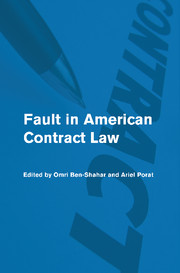Book contents
- Frontmatter
- Contents
- List of Contributors
- Preface
- Acknowledgment
- I THE CASE FOR STRICT LIABILITY
- II THE CASE FOR FAULT
- III BETWEEN STRICT LIABILITY AND FAULT
- IV WILLFUL BREACH
- 10 When Is a Willful Breach “Willful?” The Link Between Definitions and Damages
- 11 Willful Breach: An Efficient Screen for Efficient Breach
- 12 An Information Theory of Willful Breach
- 13 Contract Law and the Willfulness Diversion
- V COMPARATIVE FAULT
- VI THE MORALITY OF BREACH
- Case Index
- Subject Index
- References
13 - Contract Law and the Willfulness Diversion
Published online by Cambridge University Press: 10 November 2010
- Frontmatter
- Contents
- List of Contributors
- Preface
- Acknowledgment
- I THE CASE FOR STRICT LIABILITY
- II THE CASE FOR FAULT
- III BETWEEN STRICT LIABILITY AND FAULT
- IV WILLFUL BREACH
- 10 When Is a Willful Breach “Willful?” The Link Between Definitions and Damages
- 11 Willful Breach: An Efficient Screen for Efficient Breach
- 12 An Information Theory of Willful Breach
- 13 Contract Law and the Willfulness Diversion
- V COMPARATIVE FAULT
- VI THE MORALITY OF BREACH
- Case Index
- Subject Index
- References
Summary
As a general matter, American contract law imposes strict liability for breach. The willfulness doctrine, under which the damages awarded apparently depend on the reason for the promisor's failure to perform, seems an exception to the strict liability approach. For an influential set of willfulness cases, however, the exception is merely apparent. In these cases, fault seems not to be truly part of the judges' willfulness conception and punishment seems not to be part of their goal. Rather the judges use the esoteric legal term of willfulness in a mundane process: the calculation of expectation damages.
Introduction
Expectation damages for breach of contract are generally awarded on a strict liability basis. That is, in the typical case, the reason for the promisor's breach is irrelevant. It is often stated that an exception to this general rule occurs in the event of “willful” breach, which is said to justify special damages. The supposed exception has led to a conundrum because every instance of anticipatory repudiation is in some sense willful as is every refusal to cure a deviation from promised performance, yet in only a subset of these cases is the “willful” label attached as a reason for a high damages award. Why then are some, but not all, intentional breaches singled out for condemnation?
- Type
- Chapter
- Information
- Fault in American Contract Law , pp. 190 - 204Publisher: Cambridge University PressPrint publication year: 2010



